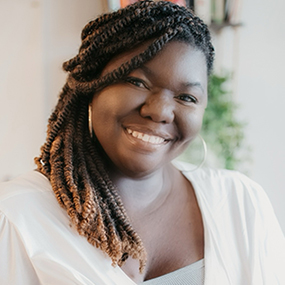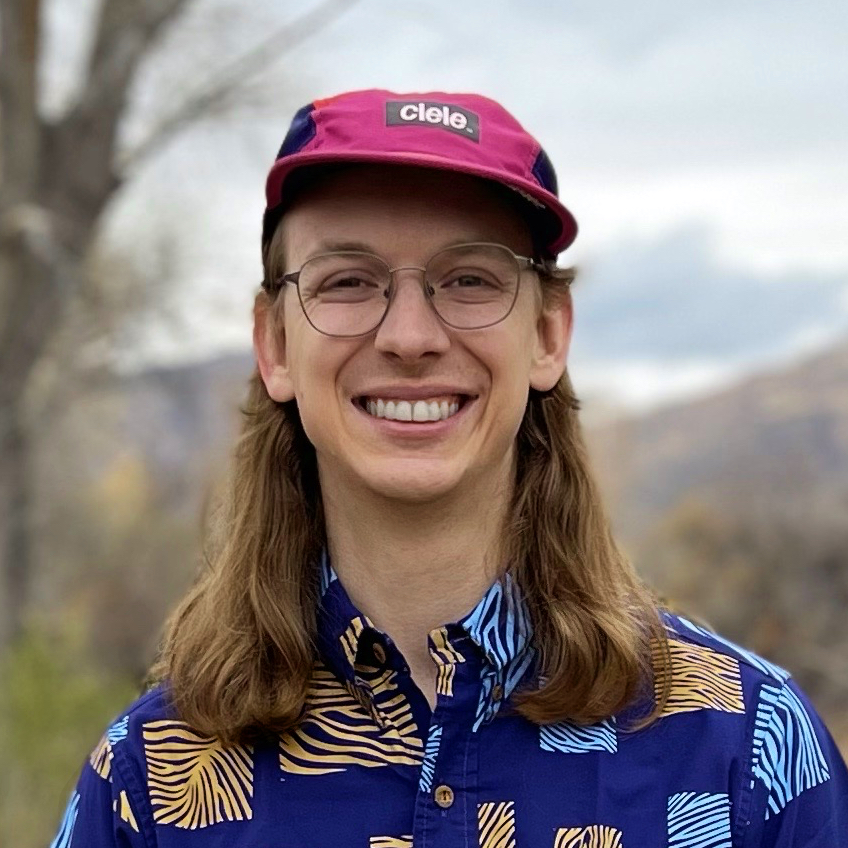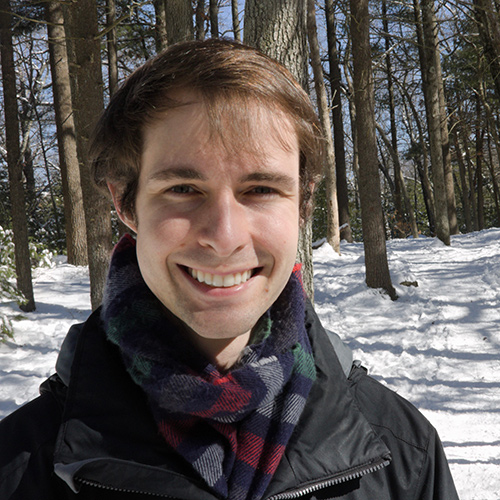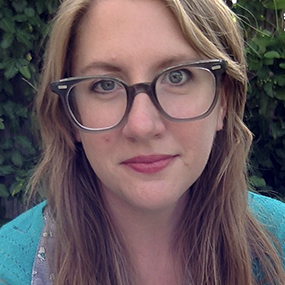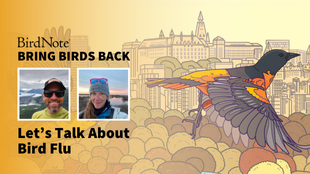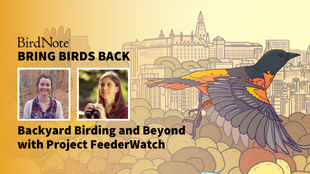

Join BirdNote tomorrow, November 30th!
Illustrator David Sibley and actor H. Jon Benjamin will face off in the bird illustration battle of the century during BirdNote's Year-end Celebration and Auction!

So many of the challenges facing birds are systemic, bigger than what any one person can fix — so how do we get governments to step in and do something? Tykee James, a Sr. Government Relations Representative for The Wilderness Society, has approached this issue in a creative way: by organizing bird walks around the U.S. Capitol. These walks bring in staffers and legislators from across the country and across the aisle, creating a rare space in politics for people to come together and kindle a love of birds. Tenijah talks to Tykee about his bird walks, staying hopeful in the face of huge issues, and they delve into some promising legislation called Recovering America’s Wildlife Act that has the potential to help our bird friends.
You can check if your Senators are cosponsors of Recovering America’s Wildlife Act and contact them about what the legislation means to you.
Tenijah Hamilton: BirdNote Presents…
[Echoing Wingflaps SFX]
[Playful, jazzy music begins]
Tenijah Hamilton: From BirdNote, this is Bring Birds Back. I'm Tenijah Hamilton.
This show is all about the ways we can help protect birds — and we try to focus on simple, achievable actions. But at the same time, the challenges facing birds are huge. They’re these systemic problems that need to be addressed in a way no individual can.
So what are we supposed to do? Well, there's one place where individual action and systemic change come together, and we might not always like it, but that place is politics. It's not for everyone, I know, but it is for my friend Tykee James. His job is advocating for birds and wildlife in Washington D.C.
And I get it y’all, it feels impossible to get anything done in Washington these days. But there is at least one place that people from both sides of the aisle on Capitol Hill get together and think about the environment — at the monthly bird walks Tykee holds for congress people and their staffers.
Tykee and I talked about his birding events, how birds can bring people together, a promising piece of legislation that he wants to see over the finish line, and, yeah, some top-tier corny jokes.
We sent a producer to join Tykee for one of these events.
Tykee James: …Nice to meet you. Jonathan, nice to see you. I'm Tykee.
Naomi: I'm Naomi.
Tykee James: Oh, how are you?…
Tenijah Hamilton: Heads up that we had some technical difficulties recording our interview, so for some sections we had to use Tykee’s backup phone audio. Sorry about that. I promise though, the conversation is super worth it.
Alright — let’s dive in.
[Music fades]
So Tykee, I'm so excited to have you here today. To start, I'd love to hear about the kinds of people who join you on your monthly bird walks.
Tykee James: Great question. We have folks, who may work in the Legislative Publishing Office, LPO. And we’ll also get folks from the federal side.
Allison: Allison. I work for Health and Human Services.
Lucy: I'm Lucy. Um, I'm a policy intern this summer, working on water infrastructure stuff with the Audubon Society.
Tykee James: Democratic side, Republican side, House side, Senate side.
Shane Trimmer: Shane Trimmer. I'm with Congressman Jared Huffman's office. My knowledge and background in birding extends to everything that I've learned from Tykee.
Tykee James: I'm not a politician. Flattery doesn't get you anywhere.
Shane Trimmer: [Laughs]
Tykee James: Doesn’t get you anywhere.
Tenijah Hamilton: You mentioned that they're kind of across the street from the Hill. Do you get a sense that people kind of are in wonderment? Like, wow, like all this nature right here from the Hill.
Tykee James: Oh, absolutely. You know, you want folks to wake up and smell the flowers —I want them to wake up and see the birds.
These are folks who have worked with or for a member of Congress on Capitol Hill for sometimes just a couple months because their member just got elected and so they just got a job. Sometimes 10 or, or 12 years. They have not been to the park immediately adjacent to Capitol Hill called Bartholdi park. And I'm asking them to do this thing that they probably have never done before or only heard about it. Like, yeah, I know my grandma does it with her friends. You know, like, they'll have, like, a general idea. But then there are a couple folks who have been birding a lot on these particular walks. And because of that, they got their own pair of binoculars. They go out and bird more in personal time and you love to see it.
Producer: How many of these bird walks have you been on?
Shane Trimmer: Whew. Um, I'm gonna guess, uh, 10 or a dozen. Yeah, I've been on quite a bit of 'em.
Producer: Are you a big birder?
Shane Trimmer: I have hesitated calling myself a birder because how I usually think of a birder is somebody who can go and identify birds on the spot. Like the majority of 'em that they see. I am definitely not that. But when I was telling birders that, oh, I'm not a birder, but you know, I'll go out. I'll have my bird book, I'll have my binoculars. I'll try to, you know — if I can't identify 'em, I'll look at my book. They're like: we have news for you. You're a birder. So people have called me that.
Tenijah Hamilton: So you've got all kinds of folks joining you — what's it like on these walks? Like, help paint a picture for me. I wanna know: what are the highlights for you? Like tell me about it.
Tykee James: Personally for me, I love telling jokes.
[Jaunty tuba music begins]
Tenijah Hamilton: We love jokes. Throw it at me.
Tykee James: Well the best joke I can tell on the Hill— so we're walking around and people are like, oh, what kind of birds are you gonna see?
Tykee James: Well, when we're on this side of the capital, these are called House Sparrows. When we're on the other side...
Walk participant: Senate sparrows.
Tykee James: Thank you.
[Laughter]
Tykee James: And if we're not seeing sparrows, then we are also appreciating — some people say it's the same boring birds. I like to say it’s familiar. We're getting familiar with these five, with this 15, and then the other ones really stick out. You look at enough House Sparrows, a Song Sparrow really sticks out to you.
Tykee James: Now when birds get up that high and the sun's hitting that way, you get a lot of silhouette. This is where shape becomes really handy. When I first talked about the gray catbird, I talked about the color. But it's not just color. It's also shape. Shape is more reliable sometimes.
Tykee James: We look around to see what birds we can find from the reflecting pool in front of the Capitol. We can see the rotunda and we go to the outdoor section of the US Botanic Garden park, and we always find there's a new story that happens whenever we get to enjoy ourselves that way.
Walk participant: Oh, there's a nest up there too.
Tykee James: Yeah, that nest looks active. Like, they still got their lights on. Wow. We're about to see some nature y'all.
[gasp]
Walk participant: what is it?
Walk participant: …Is that a racoon?
Tykee James: That is a raccoon!!!! Hot dog! What in the world? The mammals are at it again!
Walk participant: That's so funny.
Tykee James: It just peeked up slowly.
[Playful music ends]
Tenijah Hamilton: I know, for folks outside of politics, like myself, it feels really unusual to have anything that brings together, you know, people from across the aisles, Democrats, Republicans, independents, the whole gamut. Does it feel that unusual to you and does it feel as special as it seems?
Tykee James: I grew up with birding as a means to build trust, to build coalition, to build power with communities. And so now it only makes sense that birding, in my role as an advocate for racial justice and wildlife conservation, it only makes sense that birding is now a vehicle for us to build bridges, build common ground, right? We will be on the same path looking at the same bird, but we have different perspectives.
We have different perspectives of the same bird. I'm talking about color. You're talking about shape. I'm talking about seeing a red bird. You're talking about seeing a bird that has a nice little mohawk.
Tenijah Hamilton: [laughs]
Tykee James: And we know that we can pull these perspectives together. We know that we can pool our knowledge together, noticing, oh wow, we are sharing the same ground, but different perspectives. We can learn something from this. We can learn something from each other. And this is part of the enjoyment of birding. And I think it can be, should be, perhaps was part of the enjoyment of the legislative process. Finding common ground, honoring different perspectives and building from there. Now it’s not a secret sauce. I didn't go on a bird walk with Senator Manchin and then he all of the sudden voted for the bill.
Tenijah Hamilton: It’s not a fix all. It's not a cure all.
Tykee James: Yeah, it's not a cure all. But I do think it is an essential element to problem solving, finding common ground, honoring different perspectives and building from there.
Shane Trimmer: Bipartisan cooperation in the halls of Congress, um, has been slim to none. And so it is great to have these opportunities where we can do stuff outside of work hours, where we do have these moments of common interest. And you know, migratory birds don't have political districts or boundaries. And birders that, you know— they're gonna be just as interested in traveling to Republican- just as much as they're going to Democratic districts.
[Chill music begins]
Tenijah Hamilton: Your work is advocating for these birds and wildlife, but these walks aren't explicitly political. Right? Like, you're not spending the hour hyping particular legislation, it's, like you've said, it's for building community. So how do you know what kind of impact these are having? Like do you have any direct success stories from these walks? Or have people kind of come to you after the fact, um, you know, kind of talking about their time on the walks?
Tykee James: You know, people politic on the bird walks for sure. It is more casual than one might think. We're walking around, I'm pointing at buildings and pointing at features of infrastructure where we might be able to see a bird. Someone brings up the windows. We talk about bird safe buildings which is a piece of legislation that this staffer's boss introduced, Mike Quigley, and then spoke to another staffer and remarked "I think your boss should be on this bill because we talked about this before". And lo and behold, when you look at the co-sponsorship list after, there's a new member. But right now, let us enjoy the birds first. Then we'll talk bills. And we do see ducks, so there's plenty of bills out there.
[Duck quacking]
[Chill music fades out]
Tenijah Hamilton: Goodness. [Laughter] So I’d love to move into the how. Like, how did this even happen? How did you come up with this? How did you get it started?
Tykee James: Government affairs is a term to describe federal engagement. We're building relationships with people on the Hill, decision makers, power brokers, and that's kind of like community engagement. And what's the best way to build community? Well, in my experience, we make space to talk about birds. Because if we can talk about birds, we can talk about anything. Whether it's a story that's told vicariously or from their personal experience, or from the last time that we went birding. Because so much of that refuels me and reminds me why I wake up early, why I stay up late, why I worry about the things that I'm worried about: so that one day the power that we build will build a better world. It's about these stories.
And I want to say, for the folks at home, you could do this too. You can take your city council on a bird walk. You can take your state representatives out on a bird walk and their staff. You can do this too.
And it is so important that that happens locally. That that happens in the neighborhoods that they're working in. In the neighborhoods that you live in. In the places that you all care about. As beautiful as DC is, 99% of the people that go on my walk are not from DC.
I think that there's a space and time for it, of course, and because of the political nature of DC being a district, and not a state, another conversation for another time, we make it make sense. But it makes sense because it's local. In the same way that birds are local everywhere, stories about birds are local everywhere.
And the people that are there for those stories, the people that are there to enjoy the space to share those stories are just the building blocks of an effective movement. Are just the building blocks of what it will take to advance that important piece of conservation legislation. And on the federal level, in this context, we're talking about Recovering America's Wildlife Act.
[Funky, playful music begins]
Tenijah Hamilton: After the break, we're going to leave the bird walk and dig in more to that bill, Recovering America's Wildlife Act, and how it could be a game-changer for conservation. And we'll talk about more ways we can all get involved in helping our bird friends, regardless of where we are. Stick around.
And we're back. So, Tykee, I know your focus right now is on some legislation called Recovering America's Wildlife Act, or RAWA for short. I'd love for you to share about this legislation -- what it does, why it's important, and the status of the bill today.
Tykee James: I would be happy to. Let's first describe it as a bipartisan piece of legislation. Let's first describe it as something that has support of Democrats and Republicans alike. Not like, oh, three Republicans, 50 Democrats. No, I'm talking at least 17 Democrats. At least 16 Republicans and one independent. That independent isn't even Bernie Sanders. Um, let's first describe it as a bipartisan piece of legislation.
Tenijah Hamilton: Which is a big deal in itself.
Tykee James: Huge deal. You talk about gridlock? Well, there's no bird lock on this. Now second way to describe Recovering America's Wildlife Act: It is a once in a lifetime piece of legislation providing federal funding to State Wildlife Action Plans.
Tenijah Hamilton: And not just a little funding — RAWA would provide $1.4 billion each year between states and Native American tribes. And having this money spread out across the country is really important.
Tykee James: These State Wildlife Action Plans are informed by people all across your state, and looks into the future, not one year from now, not just five years from now. We're talking 10, 25 years from now. And you gotta have some money to do it. And states are very different in how they make funds available for State Wildlife Action Plans. Some states are a little better than others.
So providing some federal funding so that every state can get some help in drafting and then delivering their State Wildlife Action Plan will be tremendously beneficial to generations yet to come.
And it's important to note that, of course there are political boundaries that make it so that this State Wildlife Action Plan is doing this and that one is doing this and they may conflict with each other.
They say that, don't mess with Texas. Well, every species ever doesn't know that. They mess with everywhere. They fly, they crawl, they swim without regard to a passport, an ID, a residency approval, they don't care.
Political boundaries are irrelevant to wildlife. We're the only things that care about political boundaries, you know?
Tenijah Hamilton: Yeah, exactly. And it’s not only that all the states would get funding, but that Native American tribes would also get funding for conservation efforts — can you tell me about the significance of that?
Tykee James: So the about 570 federally recognized tribes manage nearly 140 million acres affecting over 500 species that are listed as threatened or endangered.
But the reality is the federal laws that are passed in Congress often exclude tribal nations, especially when it comes down to federal funding.
Tribal wildlife grants through the Fish and Wildlife Service provide some funding currently, but those grants cannot exceed over $200,000, which is not a lot of money to work with when you're working on these scales.
So the fact that recovering America's Wildlife would provide $97.5 million annually is an historic step in the right direction, which I think is very meaningful.
Tenijah Hamilton: So, as of this recording: RAWA got bipartisan support and passed the House, and Tykee mentioned how it has 42 senators co-sponsoring the bill, but it doesn't have the 60 votes it needs to pass in the Senate just yet. Tykee wants to see RAWA pass before the election, while politicians still have motivation to get things done. You know, when there's job security at stake. So with that in mind, here is what YOU can do to help get RAWA across the finish line:
[Relaxed, hopeful music begins]
Tykee James: Well, if you're listening to this, I know you're really smart. I know you have really good taste and I know you wanna bring birds back. So if you want RAWA to be voted on in the Senate to be passed, to then go onto the White House to be signed. Then tell your senators today: I wanna see that bill on the floor. Tell your senators you want to see Recovering America's Wildlife Act up for a vote before the election.
Now what if your member already supports the bill. That's okay. If they support it, say thank you. And if your senator does not support the bill, tell them why, as a voter, as their constituent, why it's important to you. Tell them why you wanna bring birds back. Why are you a birder? Tell them what it means to recover birds, knowing that 3 billion have been lost since 1970.
You end the phone call with: and that is why I want the senator to support this bill. But lead with why this is so important to you. As a constituent, they need that. That is their bread and butter justification for everything that they do as an elected official, because that describes their job security. If they lose touch with how important something is to their voters, then they lose touch with their job security.
Because that's the reason that they vote. That's the reason that they keep their job. It's because they say: my voters told me. Be the voters that tell them what they need to hear, not only why they need to be a co-sponsor, but why they need to vote for the bill. I think this is our year. I think this is our time. I think Recovering America's Wildlife Act can pass. We are literally on the edge of the edge of glory.
Tenijah Hamilton: Absolutely. And I love that part about: be the people that tell them. Be the constituents that tells them that this is what you demand of them, because you have the power to demand things of your elected representatives. So let's make sure we do that, and we use that power.
[Relaxed, hopeful music fades out]
RAWA seems really promising, and I'm so glad that you just gave us those steps that we can do to help push it forward. But I'm curious about the other ways that you think that people can help birds. How can we all be useful in making a difference for our little feathered friends?
Tykee James: Making a difference for our little feathered friends. Our little avian homies.
I would say look at how conservation projects can help job development. Building green, building smart. Wildlife-friendly infrastructure, as well as energy efficient infrastructure. These things can be very tied with one another. And I think the creativity around how that looks needs to come from a local perspective. And far too often, especially when we leave things to who we think might know better, we see that common problems exist in different places. I would say look at how designing of green spaces, and the benefits thereof, need to be designed with the intention to be equitable, and not the hope to be equitable.
I think that you should always look at how conservation projects lead to jobs. And not just jobs in outreach or grassroots, but jobs that set you up for careers. Jobs that have a huge vision, a meaningful vision for what a successful day at work looks like. For me, it was recognizing that it wasn't just the bird in the tree. But it was the tree in the habitat. And the habitat's shared history of the neighborhood.
And of course, having community co-authorship. Not: I have this proposal, please tell me what you think. I'm gonna go forward with it regardless. No. Here's the first draft. You can co-author this because it's our first draft. And that's truly what empowered community building looks like.
There are no issues too small. There are no issues too local. It's just a matter of: how do you build power? How do you build that durable political will so that you can achieve meaningful differences in people's lives?
Tenijah Hamilton: Awesome. So, Tykee, you've talked about communities joining together and building power, right? And I want to end the show today talking about the difference between influence and power. Which is something I’ve heard you talk about before. So, can you break that down for me?
[Calm, slightly playful marimba music begins]
Tykee James: I'd be happy to. Influence may allow you to move around a couple things, but power makes the difference in getting someone to do something that they would not want to do.
If I have a relationship with a member of Congress, I might have some influence. As an individual, I might have influence with that member. Hey, member of Congress, I know you like birds. You should support the Recovering America's Wildlife Act. I'm using my influence to advance a legislative outcome. This is a particular example.
If I have power, it is not as an individual do I have that power. It is me in a collective that builds that power and then demonstrates it. So member of Congress, you won by 600 votes in your last election. Me and 601 of my other friends want you to vote for this bill.
If you do not do what we're asking you to do, you can observe how that power being demonstrated will take away the thing that you want most: to keep your job. Job security as a member of Congress. I should say too, individuals have power, like a member of Congress. A member of Congress has the power to say, “No, I don't want to introduce this bill. No, I don't want a supreme court justice. No, I don't want climate legislation.” They have the power to say that. But we can build more power to get them to change their mind.
[Calm, slightly playful marimba music fades]
Tenijah Hamilton: Tykee, I'm so grateful for your time. You've been a really incredible guest. You are so knowledgeable and funny, may I add. You got me a couple times. Will it get me everywhere? Okay. Will it, will it get RAWA passed? Will it get RAWA passed?
Tykee James: Right, right. I wish I was funny enough to get passed. Like, imagine the congressmen, they're like: oh man, that Tykee feller? He's pretty funny. Let's just pass this bill to get him out of here.
Tenijah Hamilton: Tykee James is a Sr. Government Affairs Representative at The Wilderness Society in DC.
And he would love for you to go online and see if both of your senators are co-sponsors of Recovering America's Wildlife Act. You might be genuinely surprised to see who is or isn't already onboard -- our producer, Mark, he lives in Mississippi, and was really surprised to see that both of his senators are co-sponsors, while like Tykee mentioned Bernie Sanders is not yet signed on. So Vermonters, go call your guy, go call your guy. This to say, don't assume anyone's position on RAWA — find out, and then thank them for their support or tell the story for why a bill like RAWA is important to you.
If you're nervous about cold calling your elected official, use a script or write down what you want to say so you don't get flustered — it really helps! And you can always send an email. The birds? They don’t have phones! They can’t use email! So we gotta do it for them.
We've got links to this and so much more - on our website, BirdNote dot org.
Bring Birds Back is produced by Mark Bramhill and me, Tenijah Hamilton. Our production assistant is Sam Johnson. Our fact checker is Conor Gearin. Our content director, and editor this season, is Allison Wilson. Danny Greenwald was our field producer in DC for the birding trip. Music is by Cosmo Sheldrake, Blue Dot Sessions, and Sam Johnson.
Tykee James: You know, first we gotta teach folks how to use binoculars. We scan the buildings and one time we saw an attempted murder on top of Health and Human Services.
Tenijah Hamilton: Oh, that's intense. Little deep. Little dark.
Tykee James: Yeah two crows just sitting up there. You know and it’s just like —
Tenijah Hamilton: Tykee!
Tykee James: Well, what, wow. Look at, look at those crows. It's building towards a full murder.
Tenijah Hamilton: I have to keep sharp!
[Laughter]
About guest Tykee James:
Tykee James has been a leader in the birding community for over a decade as an advocate for equitable access to the benefits of nature for all. From his first job as an environmental educator in his own neighborhood, to his current role as a lobbyist at a land conservation organization, Tykee shares his passion for birds to build trust, coalition, and power.
He co-founded Black Birders Week and a non-profit organization called Amplify the Future while he sits on the boards of DC Audubon Society, Wyncote Audubon Society, The Birding Co-op, Justice Outside, and Wilson Ornithological Society.
In his free time he like to dance, cook, and just picked up sewing so he can tailor his own clothes.

